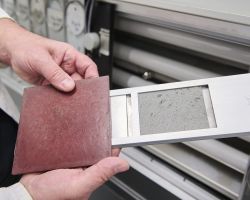Scientists from the univerzity in Zlín are looking for a way to make better use of recyclates
Zlín, 8 November 2021 – Scientists from the Zlín university are investigating how to use recyclates and construction/ quarry waste in other ways. Once sorted, plastics and beverage cartons – used for milk, juice etc. – will be possible to reuse in the future. How such materials could be re-processed is now the subject of intense efforts of scientists from the group for environmental technologies active as part of the Centre for Polymer Systems (CPS) at Tomas Bata University (TBU) in Zlín.
They are also looking for possible combinations with construction waste. Currently, they are seeking ways to combine these types of material, i.e. sorted plastics, remnants from Tetra Pak product recycling processes and construction waste, and give them a new meaning. The resulting composite can thus be used to make tiles, roofing or decorative cladding, for example.
“Sand, stone dust, crushed bricks or other types of matter can be used as filler. Blending this natural ingredient with plastic recyclate produces a plastic material that can be thermoformed into various products. In addition, we can add a considerable amount of beverage carton fragments stripped of the paper layer which are still difficult to use,” says Jaroslav Císař, a member of the research group involved in this project. The mineral component also guarantees the hardness of the resulting product and gives it a natural look.
The first phase of the research is now complete and a licence agreement regulating the production know-how and the recipe itself has been signed, through Technology Transfer Centre (TTC) at TBU in Zlín, with an industrial partner, which is Plastics Cluster. Plastics Cluster conducts further negotiations with, for example, Fortemix, s.r.o. The present stage covered composites suitable for interiors, that is, materials that comply with building restrictions and are non-flammable as well as non-hazardous. Stage 2 of the research will see the researchers tackling products for external use, such as outdoor tiles or decorative pot covers.
“The formulas designed can contain a high percentage of natural ingredients – such as fine matter sourced by crushing building rubble, making the product stable in outdoor settings. In addition, we are handling not only the economics, but also environmental-friendly use of secondary raw materials that would otherwise lie at landfills,” adds Martina Pummerová, a scientist at the Centre of Polymer Systems.
Research specialists will now describe the proposed recipes in detail to support future producers with a complete package of facts describing, for instance, how many years the resulting product will last in the garden or what maximum amount of each ingredient / how large particle size of natural ingredient companies can use or what enhancers they can add to the formula. Circular Economy is one of the key research areas that the Centre of Polymer Systems is dedicated to.
Contact:
Mgr. Petra Svěráková (Ms.)
Spokesperson
Tomas Bata University in Zlín
Telephone: +420 777 852 440




